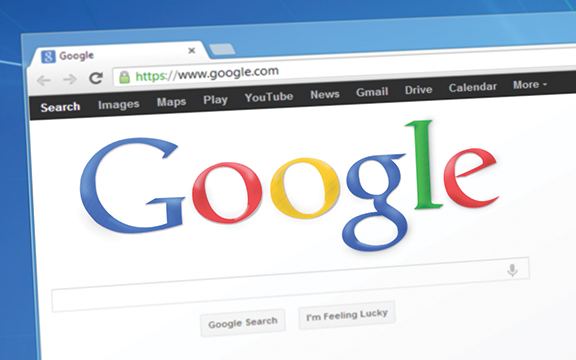Dig That Information
Yesterday my iPhone went all “fuzzy,” a highly technical term we used to use to describe what happened when your television set’s signal was interfered with. Then it went black. Fortunately, a hard re-boot (on the iPhone, the Home button plus the Power button pressed simultaneously) fixed things.
The episode, plus the state of the world right now, got me wondering about our reliance —dependence— upon our devices and the internet not just for basic communication (texts and phone) but for information. And what, thought I in my most conspiracy theory fashion, if that information was being managed in a malign way?

Google is most people’s go-to for search. In fact, “google it” has become like “zipper.” It’s a brand, but it’s also the generic.
Rumor has it that the once-incorruptible Google (“Do no harm”) has been corrupted. At least, in terms of unbiased search results. There’s been a lot of back and forth about that –but when you think about the sheer size and scope of Google, you can appreciate the devastation of a potential corruption.
Google itself is part of a suite of businesses owned by a holding company, Alphabet. (GOOG on the stock exchange.) Google owns more than 200 companies, as of this writing, including Android (the software that powers multiple devices, including phones and wearables), Google Maps (Google Earth), and DoubleClick, the targeted advertising giant that will track you wherever you try to hide on the Internet. Google also owns WAZE (a very popular GPS/navigation system), and SLIDE for social gaming.
If you read through its acquisitions, Google has pretty much every angle sewn up when it comes to software: robotics, photos, video editing, mapping, adware, gaming, travel, speech synthesis. All well and good, as for us, the users, it’s a benefit to have apps that, if not now, eventually, will play nicely together.
But, the biggest commodity Google owns is data: sheer, massive, huge amounts of data. Put a photo of where you were last night and what you had for dinner? Do you have a blog? What did you search for yesterday and the day before? What have you purchased online lately? It’s all data, and whether it’s aggregate or personal, it’s recorded, parsed, measured, and stored.
But what does that mean for you in terms of that search bias I mentioned? Among other things, Google is most people’s go-to for search. In fact, “google it” has become like “zipper.” It’s a brand, but it’s also the generic.
And during the last presidential campaign, Google search faced charges of biased search results:
“Creators of the video on the YouTube channel SourceFed, which had accumulated over 15 million views on Facebook and nearly 300,000 on YouTube by Friday evening, alleged Google’s search engine Autocomplete feature suppresses searches pairing the presumptive Democratic nominee with criminal activity.
If someone types “Hillary Clinton cri,” Google’s search suggests phrases like “Hillary Clinton crime reform” and “Hillary Clinton crisis”, said Matt Lieberman, host and writer for SourceFed, in the video. Yet after typing the same phrase on Yahoo or Bing search, suggestions on crimes and criminal activity are among the first suggestions, he notes. SourceFed said the autofill on Google occurs despite the fact “hillary clinton crimes” is a far more popular search phrase than “Hillary Clinton crime reform.” (USA Today)

We depend upon our devices and the internet not just for basic communication (texts and phone) but for information.
Google defended itself, and the little teapot’s tempest died down, but the recent headline firing of an employee for writing a memo about women, STEM careers, and the corporation, has heated the issue up again. That, and the issue that has arisen over advertising and political commentary. YouTube has long since monetized channels of content. Individuals created content, and a channel, and advertising was inserted into it. Popular YouTube channels got tons of likes, subscribers and watches –and the money partially accrued to YouTube and partially to the channel. More and more individuals were able to bypass the TV or Cable programmers and simply put their stuff out there for people to watch. And then YouTube began to “de-monetize” some of them. Again, that scary idea of censure. (Many have gone to platforms like Patreon to avoid this, and allow users to subscribe directly.)
Just the other day, I wanted to know what actor played a role on a TV series. I picked up my phone, and quickly and easily got everything I needed to know about the actor, his age, marital status, children’s names, other roles, and so on. It was easy. Too easy. By “too easy” I mean the information was readily available, it was copious, and I didn’t question it.
Now, granted, that’s “safe” information. But today, I did a little political search. The details aren’t important, my sudden “oh-oh” moment was. It dawned on me that I have no way of knowing whether what I got back was the truth, the whole truth, and nothing but the truth. I had to test the idea: but how do you test whether search results are biased if the search results are biased?
The obvious possibilities are: use several different engines (Bing, Yahoo, and Google, for example) and three different browsers (Chrome, Explorer, Firefox), and run a few permutations on the same search string (or better yet, let the browser complete your string on what could lead to a biased result – as noted above) and see what happens.
My results? I got a different set of links for each one, and in different order, but nothing that would send me into Information Panic.
Ultimately, though, it’s possible that we’ve taken a step or two back into the library stacks: select your topic, search, then deliberately go to publications and sources that you simply know about, and search the topic within those references. Digging may have to become a little more manual again.











